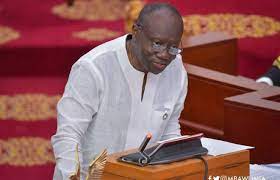Government abolishes road tolls in 2022 budget
Revenue generated from road tolls are mainly used to finance, fix and maintain public roads.

Government has announced in its 2022 budget statement of abolishing road tolls on all public roads and bridges in the country.
According to the Minister of Finance, Ken Ofori-Atta, who made the presentation on the floor of Parliament, he said tolling stations have become market centres, leading to heavy traffic on roads, lengthening travel time and impacting productivity negatively.
“The congestion generated at the tolling points, besides creating these inconveniences, also leads to pollution in and around those vicinities. The expected impact on productivity and reduced environmental pollution will more than off-set the revenue forgone from removing the tolls,” the minister said.
The scrapping of road tolls takes effect once the budget is approved.
He also mentioned that toll personnel who work at the various toll booths will be reassigned.
Revenue generated from road tolls are mainly used to finance, fix and maintain public roads.
While some have argued that the levies have failed to improve the state of roads in the country, the Ghana Highways Authority has held that Ghanaians ought to pay more in road tolls if they want better roads.
Although road tolls have been scrapped, the government has introduced an Electronic Transaction Levy, which according to the minister, will be used to support roads infrastructure, entrepreneurship, youth employment, cyber security, among others.
The Electronic Transaction Levy also known as E-levy, which takes effect on February 1, 2022, will cover all electronic transactions from mobile money payments, bank transfers, merchant payments, inward remittances, and will be charged at a rate of 1.75 per cent.
Transactions that add up to GH¢100 or less per day (which is approximately GH¢3000 per month) will be exempt from the levy.
“Mr. Speaker, this new policy comes into effect from 1st February, 2022. Government, therefore, calls on all industry partners to ensure that their systems and payment platforms are configured to implement the policy by 1st February,
2022,” the minister stated.


